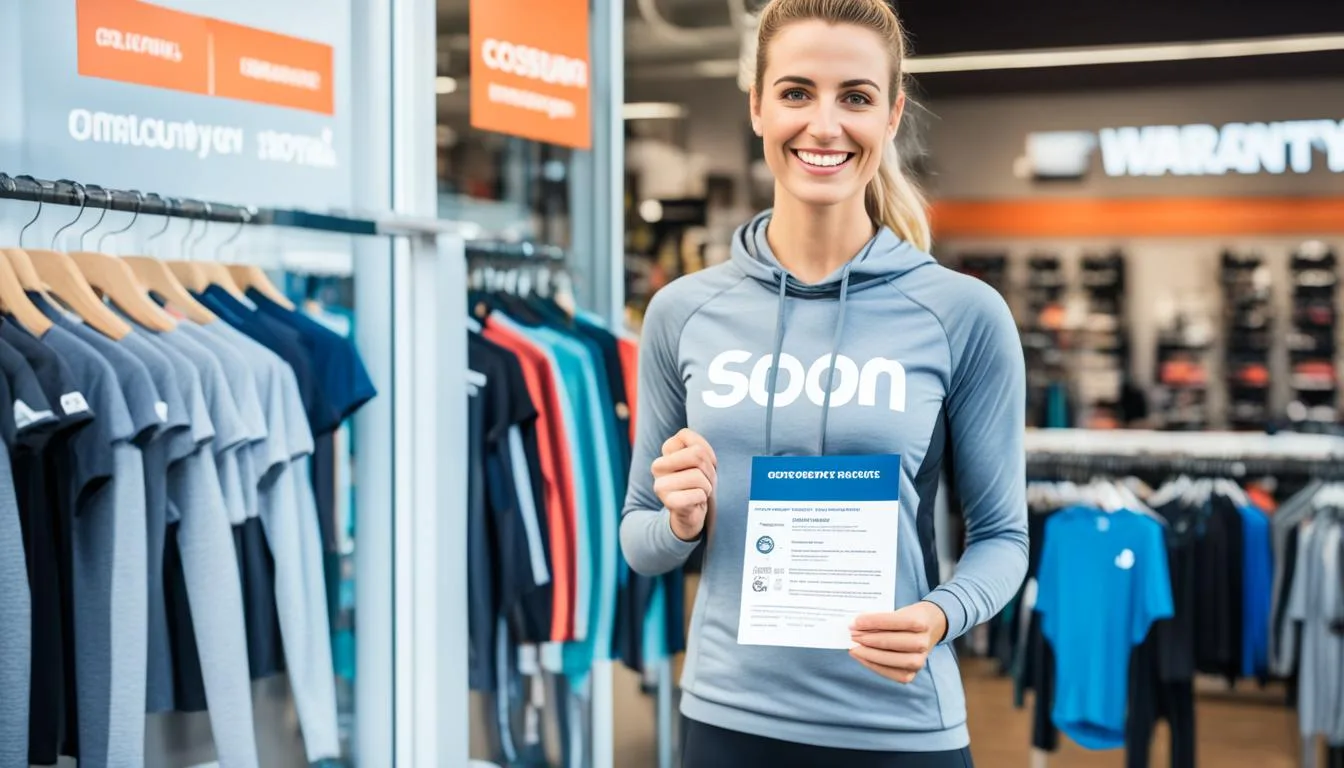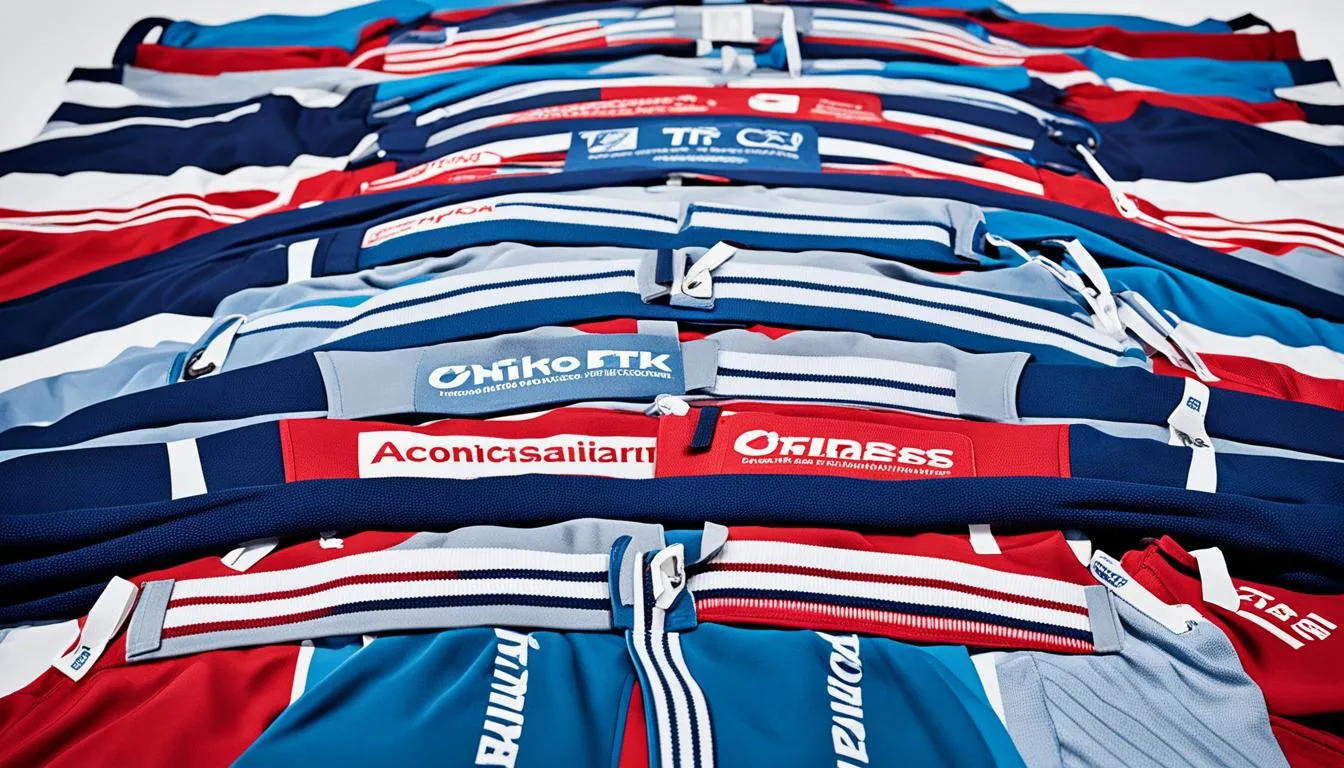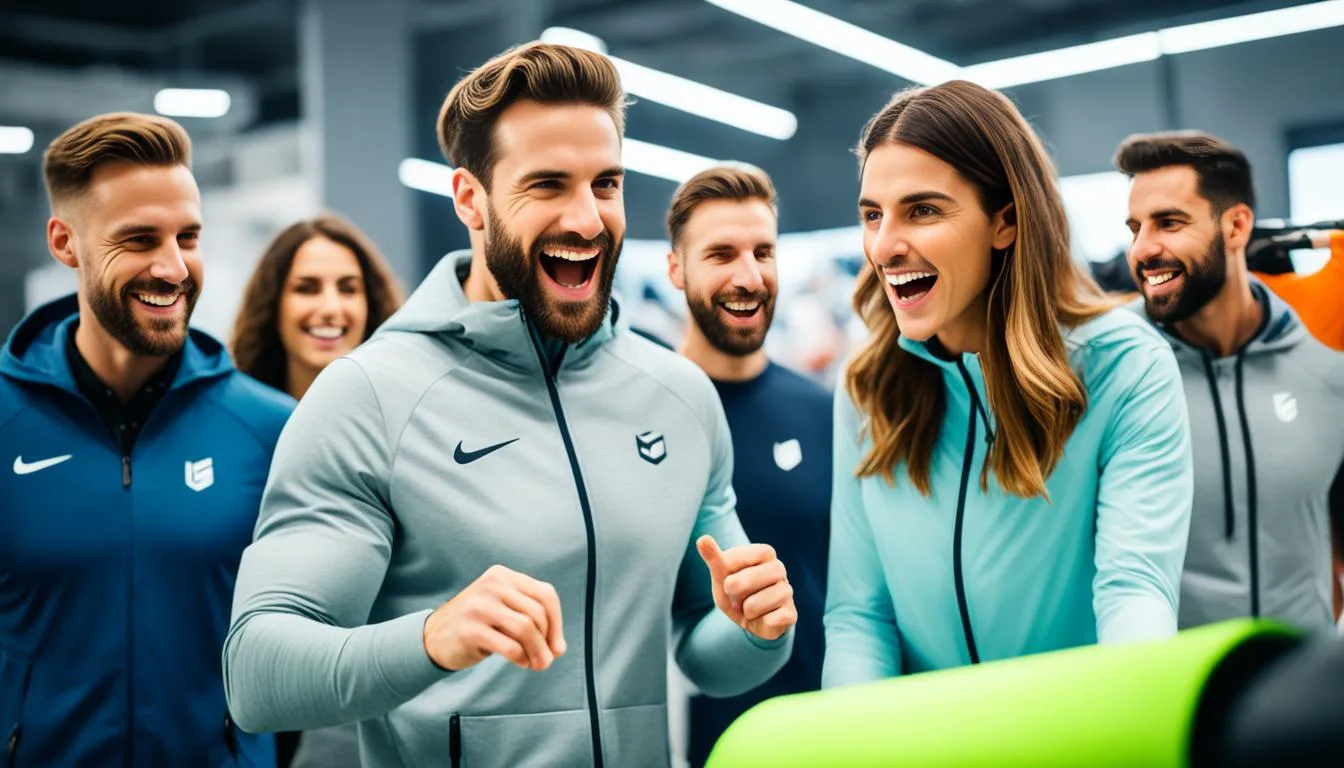The Role of Certifications in Enhancing Brand Credibility
Connect With Us Today
Consider us for your next production run. Why wait? Send us your questions here.
In today’s competitive business world, certifications have become crucial for brands. They show commitment to quality and help build a strong reputation. Certifications like ISO 9001 and ISO 14001 are key. They are given by the International Organization for Standardization (ISO) and boost brand trust1. These awards are more than just symbols. They prove a business’s dedication to high standards in quality and environmental care. This makes customers see the brand in a positive light, increasing its credibility1.
Accreditation is important too. It means that an independent group confirms certifications are in line with global standards. This step gives the certifications more power, further increasing trust in the brand1.
Many shoppers trust brands with ethical certifications more2. Showing these certifications can make a big difference. In fact, loyalty is higher among these consumers, with 58% sticking with brands that have ethical certifications2. Brands like Patagonia and The Body Shop are great examples. Their commitment to ethics has won them many loyal customers2. This shows businesses that gaining trust through certifications is a good pathway to enhancing their reputation.
Key Takeaways
- Certifications establish brands as industry leaders in quality and reliability.
- International Standards like ISO 9001 and ISO 14001 enhance brand trust and prestige1.
- Independent accreditation underscores certification validity, influencing brand perception positively1.
- Ethical certifications significantly increase consumer trust and loyalty, essential for brand growth2.
- Brands that demonstrate their commitment to ethical standards distinguish themselves in the market2.
Understanding Certifications for Brand Credibility
Certifications are vital for a brand’s reputation. They show a business’s commitment to quality. Certificates prove a company follows important standards, boosting consumer trust.
Defining Brand Credibility and Certifications
Brand credibility means how much customers trust a brand. Certifications from respected organizations help build this trust. For example, NSF certification shows a product meets high safety and quality standards3.
With such certifications, businesses can promise top-quality products3.
Types of Certifications That Influence Brand Perception
There are many types of certifications, each significant to a brand. They prove excellence and give a brand an edge3. NSF certification, for instance, helps a brand grow its presence in the market3.
B Corp status is also gaining notice. Many people recognize its logo. This highlights the power of certifications beyond the certificates themselves4.
How Certifications Validate Business Expertise and Quality
Certifications are signs of quality and expertise. NSF certification can boost sales. It shows you’re trustworthy3.
Certifications like B Corp greatly influence consumer choices. A lot of people look for B Corp when shopping4. Knowing about B Corp can also make people want to work for a B Corp company4.
For maximum effect, brands should pick certifications wisely. Certifications like NSF for Sport® highlight a commitment to excellence. Choosing the right certifications can enhance a brand’s image3.
| Certification | Industry | Expertise Validated | Influence on Brand Perception | Consumer Impact |
|---|---|---|---|---|
| NSF | Dietary Supplements | Quality and Safety Standards | High Credibility & Trust | Increased Sales & Market Share3 |
| B Corp | Various | Rigorous Ethical Standards | Social Responsibility & Ethical Practices | Brand Loyalty & Purchase Preference4 |
Certifications are key for brands to demonstrate commitment to best practices. They not only improve brand image but also build consumer trust and loyalty. This is crucial in a competitive market.
The Role of Certifications in Enhancing Brand Credibility
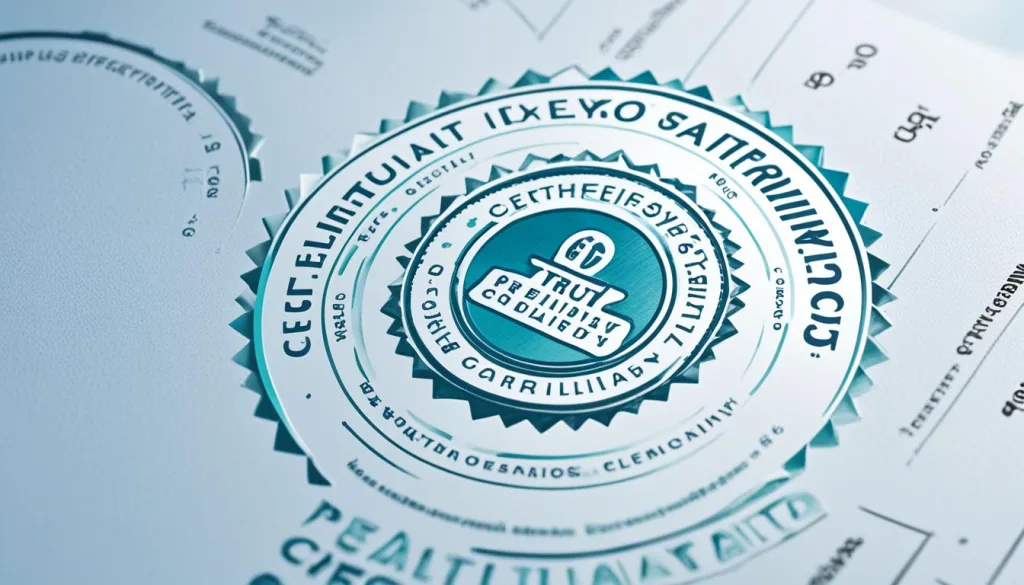
Certifications are key to earning customer trust. The NSF certification boosts brand trust in the dietary supplement field. It shows a brand’s promise to safety and quality, which buyers look for3. Brands with the NSF mark stand out, gaining loyalty. This leads to more sales and better market position3.
Retailers know they must choose products with trusted certifications. Adding credentials like Good Manufacturing Practices besides NSF certification can draw more customers3. Today, people also judge a brand’s impact on society and the environment, especially millennials5.
Certifications also ensure long-term sustainability. They give valuable insights into the supply chain and help in facing climate change5. They promote better practices for the environment and worker safety. This dedication to certification wins over 63 percent of consumers who value trust over reputation5.
Digital credentials increase revenue and visibility through effective online showcasing. For instance, brunchwork’s LinkedIn views soared with digital badges6. Using digital certification data helps in improving online brand strategies6.
In the end, certifications let a brand clearly showcase its values. They’re essential for building trust and showing readiness for the future. Whether it’s NSF certification for product safety3, or digital badges for online visibility6, certifications are crucial for credibility today.
Maximizing the Benefits of Brand Certifications
Brand certifications do more than show success; they build trust and show you’re a leader. Getting certified is just the beginning. Using them well can really make your brand stand out and grow. We’ll look at ways to use certifications smartly to tell your brand’s story and connect with people.
Strategic Display of Certifications in Marketing
Showing off certifications in your marketing can make your brand look good and make customers trust you more. Putting the ISO 9001 badge on your website and products tells everyone you care about quality and making customers happy7. Showing off your Six Sigma Certification tells people you work hard to be efficient and cut mistakes, which customers who care about value will like7. It’s also smart to highlight green certifications like ISO 14001 and Energy Star to win over those who care about the planet7. Talking about these in reports and messages can really influence how people see you.
Sharing Success Stories and Case Studies
Sharing stories and case studies is a great way to show how certifications make a difference. For instance, a story on ISO/IEC 27001 certification can show you’re great at protecting important data, which is key for tech and healthcare fields7. A story on how LEED certification made a building better can prove that these standards work and inspire others7. Talking about how being green saves money and sparks new ideas is also key for your brand and how it’s seen7.
Engagement with Industry Influencers and Customer Testimonials
Connecting with big names in your field and sharing customer stories can make your certification seem more real and trustworthy. When experts praise your commitment to safety through certifications like CISSP and CompTIA Security+7, it makes others respect and trust you more. Also, hearing from happy customers makes the benefits of your products or services feel more real. This is really important for Benefit Corporations because it shows they really do good for society, as seen by everyone involved8.
By smartly mixing certifications into your marketing, sharing great examples of success, and connecting with experts and real customers, your brand can stand out more. With the B Corp movement’s growth, showing you’re certified isn’t just about quality; it’s about joining a community that shares your values and goals9.
Building Consumer Trust Through Certifications
In today’s market, building consumer trust through certifications is a must. A big 73% of people want to change their shopping to help the planet10. This shows how important certifications are to eco-friendly consumers.
Consumers really trust certifications from third parties, with 85% valuing them for checking product claims10. These badges of honor help assure customers the products are real and meet green standards.
For natural items, certifications like USDA organic and Non-GMO Project verified lead the pack. They show the product meets strict quality and ethical guides. This builds a strong trust bridge with shoppers.
People keep an eye on labels, with 64% looking into claims before buying10. So, being clear and open about product info is key. Almost half of shoppers see labels like USDA organic as proof of honesty10.
Brands only have 13 seconds to show their values using trusted seals like organic or gluten-free10. These seals can sway shopping choices. They are crucial for standing out and gaining trust.
Certifications mean more than just symbols on packages. They tell a story of a brand’s dedication to being good. Showing off these certifications connects brands with their customers on a deeper level. It also puts them ahead in a competitive, choosy market.
Stats show people look for real, checked claims and standards. Certifications at key points make a big difference in winning trust. It’s a chance brands need to grab to build lasting relationships with consumers.
| Certification | Influence on Natural Shoppers | Transparency Perception |
|---|---|---|
| USDA Organic | 41% | Crucial |
| Non-GMO Project Verified | 36% | High |
| Fair Trade Certified | 21% | Significant |
| Certified Plant Based | 16% | Emerging |
| Certified Gluten-Free | 15% | Important |
Gaining Competitive Edge with Notable Certifications
Certifications are becoming key in today’s fast-paced business world. They prove one’s skills and show commitment to growing professionally.
Identifying Industry-Relevant Certifications
Choosing the right certification starts with knowing the industry well. For example, people with PMP certification earn 26% more than those without it11. This shows the value of picking certifications that match your goals and the market.
Investing in Ongoing Professional Development for Certification Achievement
Getting key certifications is about continuous growth. This dedication to learning boosts career longevity and adaptability. Clients prefer certified consultants, showing the value of this commitment11. Always learning new skills can greatly improve your work and career path11.
Highlighting Certifications in Competitive Marketing Strategies
Smart marketing of your certifications can make your brand stand out. It shows you meet strict standards and boosts your credibility11. This strategy puts certified professionals ahead of competitors.
Certifications benefit not just individuals but whole companies. They create a culture of continuous improvement12. This environment fosters personal development and confidence, equipping teams for complex decisions12.
Data shows certifications lead to more satisfaction, leadership chances, and better job opportunities13. In a changing job market, having relevant certifications can make a huge difference in career growth.
| Certification Advantage | Professional Impact | Strategic Value |
|---|---|---|
| Higher Median Salary | 26% increase for PMP holders11 | ROI on Professional Development |
| Market Differentiation | Enhanced employment prospects12 | Competitive Brand Positioning |
| Organizational Culture | Encourages ongoing learning12 | Inspiration for Collective Excellence |
Professionals and companies continue to stress the importance of certifications. They offer significant value and shape careers and organizational success.
Conclusion
NSF certification is a top mark of quality in the world of dietary supplements. It makes a brand stand out by assuring safety and quality to consumers. Working with reliable manufacturers makes the certification process easier and sets a high standard. Getting certified, including NSF/ANSI 455-2 for Good Manufacturing Practices, boosts trust in your products
It’s important to set straight myths about certification. Certification is not just a one-time thing; it’s a key part of gaining trust and sales. Choose well-regarded certifications to build your brand’s credibility and ensure safety. This hard work is not just a benefit but essential for standing out in a competitive field. It guarantees quality and earns consumer trust
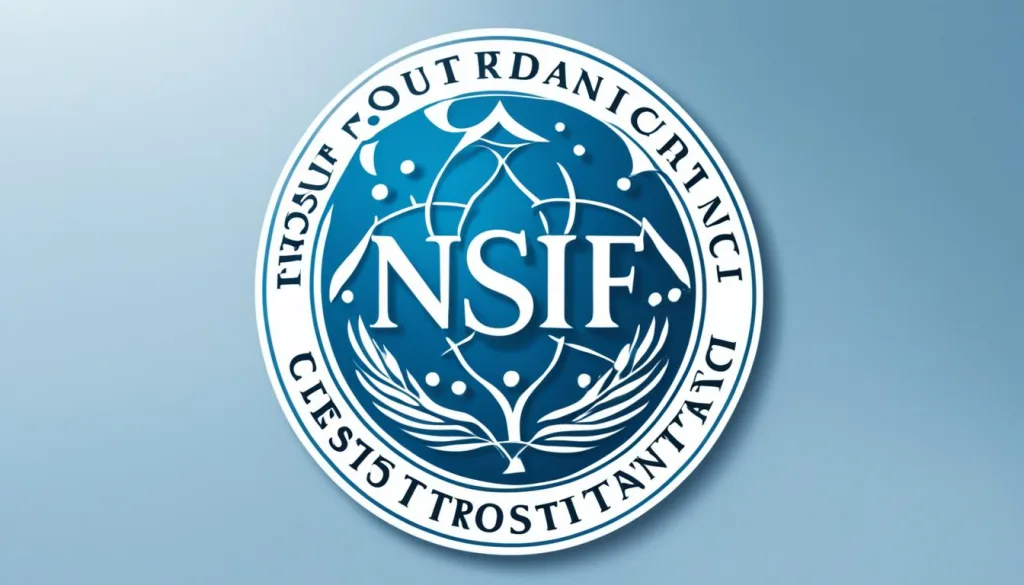
| Benefits of NSF Certification | Impact on Retailers |
|---|---|
| Confers competitive advantage | Enhances product differentiation |
| Reputable Good Manufacturing Practices | Assures consumer safety and quality |
| Multifaceted certifications | Strengthens brand credibility and appeal |
| Counteracts misconceptions | Promotes enduring market success |
Finally, aligning your brand with rigorous certification standards boosts its standing. This strategic approach garners trust from your customers and solidifies your place in the dietary supplement market.
Frequently Asked Questions (FAQ)
Businesses often wonder how certifications affect their reputation. Certifications can make customers trust a brand more. It’s important for companies to be honest in their ads, as required by the Federal Trade Commission (FTC). They insist on truth in advertising to prevent misleading endorsements. Companies must follow these rules to keep their good name. This is outlined in the FTC’s Endorsement Guides14.
The FTC keeps updating its guidelines to keep up with new advertising methods, especially on social media. They emphasize being clear with endorsements. Even people who don’t follow a brand on social media can affect its image. Their views on influencer posts matter as much as those of direct followers.
Getting BRCGS certification means understanding its legal side too. If a product doesn’t live up to its hype, the FTC can impose penalties. This shows how vital honest advertising is. Ads must not promise more than what the average customer will experience. Staying true in promotions builds trust with customers. It also shows the brand’s commitment to meeting FTC standards.
FAQ
What is the role of certifications in enhancing brand credibility?
How do certifications influence brand perception?
What are the benefits of certifications for businesses?
How can businesses strategically display their certifications in marketing materials?
What are success stories and case studies?
How can industry influencers and customer testimonials be leveraged to enhance a brand’s credibility?
How do certifications contribute to building consumer trust?
How can brands gain a competitive edge with notable certifications?
How important is it to highlight certifications in competitive marketing strategies?
What is the significance of brand reputation compliance and BRCGS certification?
Source Links
- https://www.iso.org/certification.html
- https://greencommodities.org/decoding-ethical-certification-why-its-crucial-for-brands/
- https://www.nsf.org/knowledge-library/private-label-dietary-supplement-certification-importance
- https://usca.bcorporation.net/zbtcz11z22z/5-key-takeaways-about-b-corp-brand-awareness/
- https://www.greenbiz.com/article/using-product-certification-win-consumers-hearts-and-minds
- https://www.accredible.com/blog/how-to-increase-brand-awareness-for-professional-certification-with-digital-credentials
- https://copymate.app/blog/multi/certificates-for-businesses-an-overview-of-the-most-important-industry-certificates/
- https://cbey.yale.edu/sites/default/files/2019-10/CBEY_BCORP_Online.pdf
- https://bcorporation.eu/what-is-a-b-corp/what-does-b-corp-certification-mean/
- https://www.nsf.org/knowledge-library/five-ways-certifications-connect-consumers
- https://www.mbopartners.com/blog/how-manage-small-business/five-benefits-of-professional-certification/
- https://www.linkedin.com/pulse/why-professional-certificates-vital-career-advancement-sahu
- https://www.linkedin.com/pulse/significance-certification-professional-skills-gary-homes-taaie
- https://www.ftc.gov/business-guidance/resources/ftcs-endorsement-guides-what-people-are-asking
Latest News
How Collaboration Shapes Consumer Preferences in Sportswear
Navigating Consumer Rights and Warranties in Sportswear Sales
Artificial Intelligence in Fashion Forecasting and Trend Analysis
The Shift Towards Inclusive Sizing in Sportswear: Consumer Reactions
The Global Expansion of Luxury Sportswear Brands
From Sketch to Gym: The Design Process of Fashionable Sportswear
Understanding the Role of Trade Associations in Sportswear Compliance
How Economic Trends Influence Consumer Spending on Sportswear
Learning from Successful Global Market Entries
Best Practices for Managing Cross-Cultural Teams
Using Technology to Fight Counterfeit Fashion Products
Carbon Nanotube Fabrics for Superior Strength and Flexibility
The Growth of Fitness Tracking Apparel in Health and Wellness
Exploring the Influence of Social Proof in Sportswear Purchasing
Strategies for Managing Compliance in a Multinational Operation
Trends in Global Footwear: Performance Meets Lifestyle
The Role of Artificial Intelligence in Tracking Supply Chain Operations
Evaluating the Success of Sportswear Collaborative Projects
Evaluating the Potential of Emerging Markets
Global Shifts Towards Gender-Neutral Sportswear
Share This Article
Latest Articles


